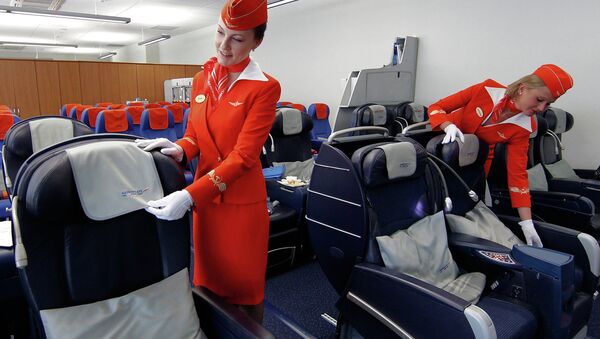Isn't there a civilized way out of this conundrum?
Law professors Christopher Buccafusco and Christopher Jon Sprigman decided to approach the debate from a purely economic perspective. They asked random people to imagine they had to take a six-hour flight from New York to Los Angeles. They divided respondents into two groups — the "recliners," who travel in the front, and the "reclinees," who travel behind them.
The team told respondents that the airlines had introduced a new policy that would allow passengers to settle the recline question via monetary means: they asked the "reclinees" how much they would pay to the person ahead of them to stay upright. At the same time, they asked the "recliners" how much they would want to agree.
Those traveling up front said they'd charge about $41 on average to ignore their seats' recline function, while the people in the seats behind them would only agree to pay about $18 to maintain their legroom.
The study took the position that the four inches or so of space belongs to the people sitting in front.
"Currently, the contested 4 inches seem to be given to the person sitting in the reclining seat. Josh Barro, writing in the New York Times, thinks that this is the correct distribution of the resource. His evidence? No one has ever offered to pay him money to not recline," the authors wrote in their article on Slate.
In their study, "ownership" of the space changed hands only in about 21 percent of cases. This, the study concluded, confirms the idea that the space between the seats belongs to the front passenger. Seems legit, right?
Not so fast. The authors also conducted a second similar study, but this time they told respondents that, according to airline' rules, the space between the seats belongs to the passenger in the back. This basically reversed the rules of the game.
"When we flipped the default — that is, when we made the rule that people did not have an automatic right to recline, but would have to negotiate to get it — then people's values suddenly reversed," the authors explained, according to the Economist.
"Now, recliners were only willing to pay about $12 to recline while reclinees were unwilling to sell their knee room for less than $39. Recliners would have ended up purchasing the right to recline only about 28% of the time — the same right that they valued so highly in the other condition," they said.
A second economic model was proposed by Daniel Kahneman, whom the Economist calls "probably the most famous behavioural economist." According to Kahneman, initial ownership does matter when striking a deal.
"People generally don't like losing things that they have. When a resource is provided to them as a default — even something as trivial as a pen — people tend to be unwilling to part with it," Buccafusco and Sprigman explained.
"As a consequence, the least amount of money they are willing to accept to give it up is often much greater than the amount that they would be willing to pay to purchase the same item," they said.
The study failed to show a uniform solution to the legroom problem, but it did lead to two spectacular findings.
First, Buccafusco and Sprigman discovered that if the value of the reclining was predetermined by the "airline" to a much lower value of $8, as much as 68 percent of front-seaters said they would accept the offer (not counting those who would simply agree to sit straight just because they were asked). However, only 23 percent of the back seaters said they would be willing to make this offer.
Things turned out differently when the authors substituted money with a gift of a similar value: a drink or a snack. It turned out that as much as 36 percent of back-seaters would agree to make an offer and 78 percent of the front-seaters would accept such gifts.
The authors concluded that ethics and morality are powerful factors in bargaining, as people resist the idea of turning everything into money: giving gifts turned out to be a significantly more effective way to distribute leg space than buying and selling it outright.
"From an economic perspective, this finding is just weird," the authors wrote. "Getting a gift should never be better than getting the gift's value. If you get the $8, you can always spend it on a drink. But what good is a drink to a teetotaler or a snack to someone who has recently eaten?"
Ergo: airlines that would like to avoid recline-related conflicts should simply allow their passengers to buy drinks and snacks for each other.
"Everyone wins. Seat recline space is efficiently allocated. Airlines are marginally further from bankruptcy. And no one gets punched in the face," the authors concluded.



